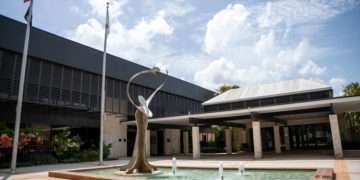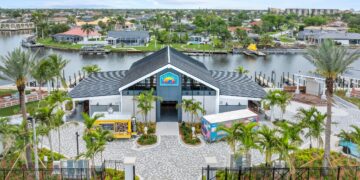Punta Gorda City Council asked its attorney Dec. 4 whether Land Development Regulations passed by the former Council in April are consistent with a special act passed by Florida Legislature.
The act was brought to Council’s attention during a presentation by city Zoning Official Rachel Barry, who outlined steps to be taken to amend its comprehensive plan and LDRs.
Council has three new members who defeated incumbents in November on a platform opposing higher density and taller buildings in the city, particularly along its waterfront. A grassroots movement was formed to oppose high-rises and higher density in the city around the time that former Fishermen’s Village owner Jon Larmore proposed building tall condos and a hotel on the iconic landmark’s site.
Before leaving office, the former council members supported changes to the LDRs adopted in April.
Mayor Debi Lux questioned whether Council can rollback the regulations to what they were previously.
Barry said should Council decide on changes in December, it wouldn’t be until January through March when LDR hearings could take place and changes made.
 But City Attorney David Levin said the Florida Legislature adopted a special act for those counties and municipalities impacted by Hurricane Ian, mandating that it would be “prohibitive to propose or adopt more restrictive or burdensome amendments” to a comprehensive plan or regulations before Oct. 1, 2026.
But City Attorney David Levin said the Florida Legislature adopted a special act for those counties and municipalities impacted by Hurricane Ian, mandating that it would be “prohibitive to propose or adopt more restrictive or burdensome amendments” to a comprehensive plan or regulations before Oct. 1, 2026.
He said if Council moved its timeline, the changes would comply with the act’s timeline, “assuming there were no further amendments to the state legislation.”
He said changes made by the city prior to Oct. 1, 2026, would void those changes.
Lux said the comprehensive plan and LDRs passed in April contain components that are more restrictive than the previous ones, such as those concerning the waterfront overlay, and she questioned whether that makes the LDRs passed in April null and void.
Levin said the new LDRs on height and density are less restrictive than what was in place, and he suggested the planning staff take a closer look at the regulations in question and then come back to Council for further discussion and/or a decision.
Lux said the new LDRs intensify development along the waterfront. Reading from a state statute regarding a marine park district, she said it should “be used for the purpose of protecting and preserving water areas within the jurisdiction of the city.”
 “The new LDRs for the waterfront were to intensify development,” she said. “We should not be intensifying development. We should be protecting it.”
“The new LDRs for the waterfront were to intensify development,” she said. “We should not be intensifying development. We should be protecting it.”
Council member Janis Denton asked whether the new LDRs allow buildings to be closer to the water, and Lux said the setbacks allow it.
“It is in violation of our comprehensive plan and should be changed,” Lux said.
Other issues, such as parking requirements, which also were changed, and the number of new homes being built were also discussed.
Denton questioned whether there would be enough water to serve residents as 600 more homes are coming onto the market.
She said the city “should make sure current residents have water. We don’t have $37 million to rebuild the reverse osmosis plant or add on to it.”
 At the last Council meeting, problems with the city’s water were discussed.
At the last Council meeting, problems with the city’s water were discussed.
Levin outlined steps Council would have to take to change the comprehensive plan should inconsistencies be found.
He said the planning staff would be able to determine if there is a conflict with the Florida statute, and if so, the matters would have to come back before Council, which could change the comprehensive plan by ordinance.
He said changes to the plan “can’t be accomplished here and now.”
Council members agreed to take up the matter again in January.





